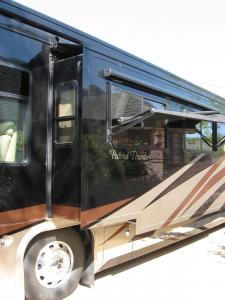Brustor Awnings
 As a new Beaver owner, I'm stomping out gremlins as fast as I can, developing a maintenance and inspection program for the bus.
As a new Beaver owner, I'm stomping out gremlins as fast as I can, developing a maintenance and inspection program for the bus.
Really, I cannot stress enough the importance of reviewing all manuals for the RV itself, the chassis, and its components; and then compiling all applicable checks into one simple list. In addition to that, I've created an airline-style maintenance tracking book, so that broken items are tracked and their repairs documented.
Since our January 12th purchase, I'd logged 71 maintenance writeups. And, I think this is on the plus side of average, in terms of failures in motorhomes that are six years old.
Recently, while running my monthly checklist, I was shampooing the carpet and got warm from the afternoon sun pouring in the driver's side windows. Lowering the eight-foot Brustor awning, I heard a loud clunk and the interior brightened as the forward end of the rolled fabric fell onto the unfolded awning arm!
Turns out, these awnings have a weakness: the retainer for the non-motorized end is made of nylon, and cracks due to vibration. The retainer can be broken and the awning remains marginally secure, propped inside the clamshell cover, held in place by a tiny stainless sheetmetal screw. That one screw then becomes all the sole difference between a safe operation, and catastrophic damage to the coach followed by sending an aluminum fixture that might weigh thirty pounds hurtling into oncoming traffic at seventy feet per second.
The failure seems confined to my longest awning: the shorter versions all seem fine and work perfectly.
But, there is even more bad news: Brustor is a Belgian company that makes a wide array of products and might be on its way out of business. All attempts to locate a dealer for parts have been unsuccessful.
Check your awnings regularly, folks. And, if you find a parts dealer for these otherwise nice fixtures, let me know.
Followup June 21, 2013 I had another small problem with this longest awning: at the beach, when it extended, there was a loud <clunk!> and the awning fabric was suddenly hanging over the window supporting the endcap. The arms dangled into open space, not attached.
Thank goodness no paint was harmed during this failure. Unlike before, when technicians had marred the side of the coach attempting to reinstall the arms after a similar failure.
Sure enough, I had not included the 4mm stainless screws that attach the arm-end to the sliding shoe of the extruded endcap in my checklist. They'd apparently backed out, leaving the endcap held against the coach enroute by the fabric and nothing more.
Almost more critically, the sheetmetal screws that attach the arm to its base (the base that slides up and down the track mounted to the side of the coach) was bent, its endplug nearly pulled upward through the gap in the extruded arm. That screw holds massive spring tension and could cause a mess when it breaks.
I removed the endcap and arms from the side of the rig, bagging all the hardware and plugs; the wife retracted the fabric into the shell for transport. This is a shop repair, not one easily performed in the field.
So, in addition to the checks outlined in the first part of this post, be sure to check the endplug with its stainless screw for security and tightness, at the base of the arms. And, the screw securing the top of the arm to the long endcap (onto which the fabric is mounted) needs to be checked for security.



2 Comments
Recommended Comments
Please sign in to comment
You will be able to leave a comment after signing in
Sign In Now